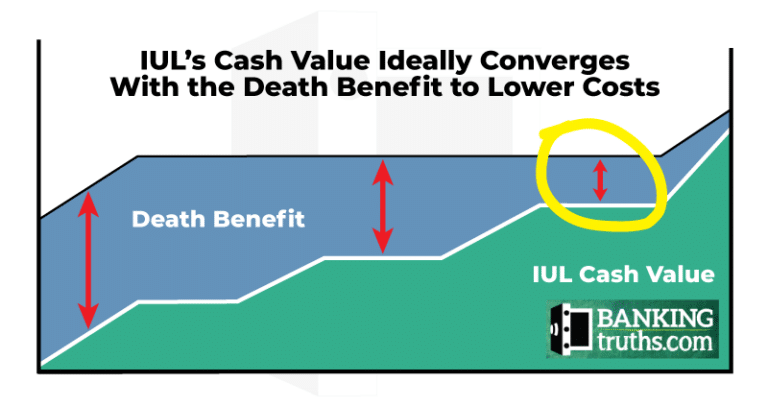All Categories
Featured
Table of Contents
Do they contrast the IUL to something like the Vanguard Total Amount Stock Market Fund Admiral Shares with no tons, an expenditure proportion (ER) of 5 basis factors, a turn over proportion of 4.3%, and a phenomenal tax-efficient document of circulations? No, they compare it to some terrible actively handled fund with an 8% tons, a 2% ER, an 80% turnover ratio, and a terrible document of temporary resources gain circulations.
Shared funds usually make annual taxed circulations to fund owners, also when the worth of their fund has actually gone down in worth. Common funds not just call for revenue coverage (and the resulting yearly taxes) when the common fund is rising in value, but can additionally impose revenue taxes in a year when the fund has dropped in worth.
That's not how common funds work. You can tax-manage the fund, gathering losses and gains in order to reduce taxable distributions to the capitalists, however that isn't somehow mosting likely to change the reported return of the fund. Just Bernie Madoff types can do that. IULs avoid myriad tax obligation catches. The ownership of common funds may call for the mutual fund proprietor to pay estimated tax obligations.

IULs are very easy to place to ensure that, at the proprietor's fatality, the beneficiary is exempt to either earnings or inheritance tax. The very same tax decrease techniques do not function nearly as well with common funds. There are countless, commonly expensive, tax obligation traps linked with the timed purchasing and selling of shared fund shares, traps that do not relate to indexed life Insurance coverage.
Chances aren't very high that you're going to go through the AMT because of your shared fund distributions if you aren't without them. The rest of this one is half-truths at best. For circumstances, while it is true that there is no revenue tax obligation because of your successors when they acquire the profits of your IUL policy, it is additionally true that there is no income tax because of your successors when they inherit a common fund in a taxed account from you.
Indexed Universal Life Pros And Cons
There are far better methods to stay clear of estate tax concerns than acquiring financial investments with reduced returns. Common funds might create earnings taxation of Social Protection benefits.

The development within the IUL is tax-deferred and may be taken as free of tax revenue through financings. The plan proprietor (vs. the mutual fund manager) is in control of his/her reportable earnings, therefore allowing them to decrease and even get rid of the taxes of their Social Protection benefits. This is wonderful.
Below's another very little concern. It's real if you get a mutual fund for state $10 per share just prior to the circulation date, and it distributes a $0.50 distribution, you are then going to owe taxes (probably 7-10 cents per share) although that you have not yet had any gains.
In the end, it's actually about the after-tax return, not just how much you pay in taxes. You're likewise most likely going to have more money after paying those tax obligations. The record-keeping demands for having common funds are considerably more intricate.
With an IUL, one's records are maintained by the insurance policy business, copies of annual declarations are mailed to the proprietor, and distributions (if any) are amounted to and reported at year end. This is also sort of silly. Obviously you ought to maintain your tax records in case of an audit.
Term Life Vs Universal
All you need to do is push the paper right into your tax folder when it reveals up in the mail. Barely a reason to purchase life insurance policy. It's like this man has actually never bought a taxable account or something. Common funds are typically part of a decedent's probated estate.
Additionally, they undergo the delays and expenditures of probate. The earnings of the IUL plan, on the other hand, is always a non-probate circulation that passes beyond probate directly to one's named recipients, and is for that reason not subject to one's posthumous lenders, unwanted public disclosure, or similar hold-ups and expenses.
Medicaid incompetency and lifetime earnings. An IUL can supply their proprietors with a stream of earnings for their entire lifetime, regardless of exactly how long they live.

This is useful when arranging one's affairs, and converting possessions to earnings before a nursing home confinement. Common funds can not be transformed in a similar fashion, and are usually taken into consideration countable Medicaid assets. This is an additional silly one advocating that bad individuals (you understand, the ones who need Medicaid, a federal government program for the inadequate, to pay for their nursing home) should use IUL instead of common funds.
Allianz Indexed Universal Life
And life insurance policy looks horrible when contrasted relatively versus a pension. Second, people that have money to acquire IUL over and past their pension are mosting likely to have to be dreadful at managing money in order to ever certify for Medicaid to pay for their assisted living home expenses.
Chronic and incurable health problem rider. All plans will enable an owner's easy accessibility to money from their plan, often waiving any type of surrender charges when such individuals suffer a significant health problem, need at-home care, or come to be restricted to an assisted living home. Mutual funds do not give a comparable waiver when contingent deferred sales charges still put on a shared fund account whose proprietor needs to sell some shares to fund the costs of such a keep.
Is An Iul A Good Investment
Yet you reach pay more for that benefit (cyclist) with an insurance policy. What a large amount! Indexed global life insurance policy gives survivor benefit to the beneficiaries of the IUL owners, and neither the proprietor neither the beneficiary can ever lose cash due to a down market. Shared funds supply no such warranties or fatality advantages of any kind of kind.
I certainly do not need one after I get to monetary freedom. Do I desire one? On average, a purchaser of life insurance policy pays for the real expense of the life insurance coverage benefit, plus the costs of the policy, plus the profits of the insurance policy business.
Equity Indexed Whole Life Policy
I'm not entirely certain why Mr. Morais tossed in the entire "you can not shed money" once again right here as it was covered rather well in # 1. He simply desired to repeat the very best marketing factor for these points I expect. Once again, you don't shed nominal bucks, yet you can shed actual bucks, in addition to face severe opportunity price as a result of reduced returns.

An indexed universal life insurance policy plan owner might trade their plan for a completely various policy without setting off income tax obligations. A mutual fund proprietor can stagnate funds from one common fund firm to one more without selling his shares at the previous (thus triggering a taxed event), and redeeming new shares at the last, typically based on sales fees at both.
While it is real that you can trade one insurance plan for one more, the factor that people do this is that the initial one is such an awful plan that even after purchasing a brand-new one and experiencing the very early, adverse return years, you'll still come out in advance. If they were offered the ideal policy the first time, they shouldn't have any type of need to ever exchange it and experience the very early, adverse return years once again.
Latest Posts
Life Insurance Cost Index
What's The Difference Between Whole Life And Universal Life Insurance
Variable Universal Life Calculator